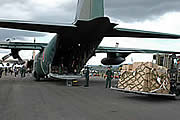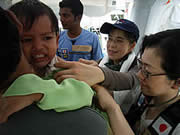|
Japanese aid for tsunami-stricken countries

Emergency supplies are unloaded from an SDF aircraft
at Banda Aceh Airport, Sumatra
© Defense Agency of Japan |

Medical assistance being provided to Indonesia
© JICA
|
As an effort to address the unprecedented damage caused by the tsunami disaster off the coast of Sumatra, Prime Minister Junichiro Koizumi, in his speech at the Special ASEAN Leaders' Meeting on the Aftermath of the Earthquake and Tsunami, pledged that, 'Japan will provide assistance to the maximum extent possible in three ways: financial resources, human resources and knowledge and expertise.'
Since the disaster occurred, Japan has been doing its utmost to help by mobilising its personnel, know-how and providing financial support.
With respect to the deployment of personnel, twelve Disaster Relief teams made up of 240 staff were dispatched to the affected region to provide expertise in medical treatment, epidemic prevention, disaster management and DNA identification. Japan also mobilised 1,580 members of its Ground, Maritime and Air Self-Defense Forces to carry out relief activities such as air transportation and maritime search and rescue operations. In addition, ten Japanese Non-Governmental Organisations (NGOs) associated with Japan Platform (a new collaboration between Japanese NGOs, business and government) provided emergency assistance in Indonesia, India and Sri Lanka.
In terms of financial resources, Japan has pledged US$500 million of grant money in emergency assistance to date. Half of this contribution has been disbursed directly to United Nations agencies, funds and programmes, and to other international organisations that are engaged in relief and rehabilitation. This $250 million makes up about a quarter of the amount called for in the UN Flash Appeal that is focussing on support over the next six months. Japan has also been providing emergency assistance (both grants and in kind) to severely affected countries upon request.
As a country prone to natural disasters itself, with countless experiences of earthquakes and tsunamis, Japan has pledged to help establish a tsunami early-warning mechanism for Indian Ocean countries.
In addition to Prime Minister Koizumi's announcement of Japan's Initiative for Disaster Reduction through ODA (Overseas Development Assistance) made at the World Conference on Disaster Reduction held in Kobe in January, Ambassador Kenzo Oshima, Japan's Permanent Representative at the Plenary Meeting of the UN General Assembly on Disaster Relief Assistance and Special Economic Assistance said: "Japan will continue to actively support the efforts of developing countries to build a 'disaster-resilient society' through a comprehensive menu of assistance such as institution building, human resources development and infrastructure development."
At the Ministerial Meeting on Regional Co-operation on Tsunami Early Warning Arrangements, Shuzen Tanigawa, Japan's Senior Vice-Minister for Foreign Affairs said, 'In order to establish an effective and durable tsunami early warning system for the Indian Ocean, first, the system should be tailor-made to suit the characteristics of the Indian Ocean and needs of the Indian Ocean countries. Secondly, countries and UN agencies with know-how and technological expertise should start concrete action to provide the necessary support in response to requests from the Indian Ocean countries.' Japan has already made a contribution of US$4 million towards this programme. In addition, Japan has started co-ordinating with the countries affected by the tsunami to hold a Japan International Cooperation Agency (JICA) training course in March.
Top
|


